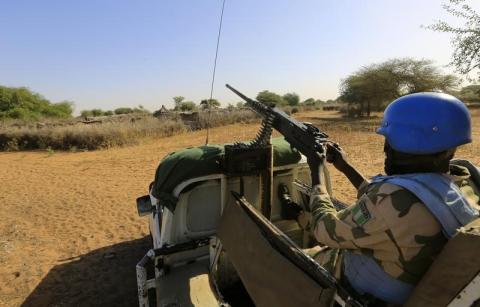Advertisement
Sudan: don't tie Darfur peacekeepers exit to tribal violence end
UNITED NATIONS (Reuters) - A withdrawal of peacekeepers from Sudan's Darfurregion should not be conditional on an end to tribal violence, Sudan said on Tuesday as Khartoum began work with the United Nations and the African Union on an exit strategy for the $1.1 billion mission.
Law and order have collapsed in much of Darfur, where mainly non-Arab rebels took up arms in 2003 against the Arab-led government in Khartoum, accusing it of discrimination. The joint U.N. and AU peacekeeping force, one of the world's largest such operations and known as UNAMID, has been deployed since 2007.
Sudan asked UNAMID late last year to prepare to leave amid a dispute over attempts by the mission to investigate an alleged mass rape by Sudanese soldiers in the Darfurtown of Tabit. The government denies any wrongdoing by the soldiers.
U.N. peacekeeping chief Herve Ladsous told the Security Council that a joint working group of the United Nations, African Union and Sudan would submit a report on a gradual exit strategy for UNAMID to the council at the end of May. He said the group began its work on Tuesday in Khartoum.
Sudan's Deputy Ambassador Hassan Hamid Hassan said that a withdrawal should not be tied to an end to tribal violence.
"Tribal violence in Darfur is as old as Darfur itself," he told the council. "We cannot condition the withdrawal, the exit of the mission, on these phenomena which are as ancient as Darfur itself."
Ladsous questioned if Hassan was indicating that UNAMID should just "fade away."
"That I think would be a sad solution if that was the meaning of it because people are suffering and suffering greatly," he told reporters after briefing the council.
According to the United Nations, about 4.4 million people need humanitarian assistance in Darfur and more than 2.5 million remain displaced. The International Criminal Court has issued a warrant for the arrest of Sudanese President Omar Hassan al-Bashir on charges of war crimes and genocide in Darfur.
Ladsous briefed the council on a U.N. strategic review of UNAMID that said the mission is slimming down, sending home incompetent units, cutting unnecessary jobs, redeploying troops stationed at dozens of outposts around Darfur and working to improve its capacity to protect civilians. [ID:nL1N0WB1O7]
(Reporting by Michelle Nichols; Editing by James Dalgleish)



















Add new comment